When I lived in Portland back in the early 2000s, one of my favorite places to take out-of-town visitors—heck, one of my favorite places for any occasion—was Laurelwood Brewing Co. up in northeast Portland. They had these fantastic rosemary-garlic fries, and their black and bleu cheeseburger didn’t just hit the spot—it hit all the spots. Most importantly, of course, they had great beer, and the man behind that beer was Christian Ettinger.
Twelve years after leaving Portland, I was back in town, sitting at a table with Ettinger, his marketing manager, Eric Steen, and his director of operations Trever Bass, at the brewery Ettinger created out of his drive not only to make great beer but to run a special kind of brewery: Hopworks Urban Brewery, or HUB.
The main location at the top of a hill on Southeast Powell Boulevard (they also have a “bike bar” on Williams Ave. and another pub in Vancouver, Wash.) feels far away from the neighborhoods that give Portland much of its charm, but HUB has carved out a comfortable getaway that, as that Thursday evening’s crowd demonstrated, makes for an attractive food and beer destination.
HUB’s Powell brewpub has a modern, even casual look, with lots of windows, an open floor plan, and dozens of bicycle frames hung over the bar as decoration. It is the kind of place you’d come after work or after a long ride or hike. Definitely the kind of place you’d think of if you had a big group with a wide range of beer preferences.
The draft list featured some 20 beers of all styles, plus a radler and a couple ciders. (Maybe a radler is technically a beer, but I still think they’re weird.) Eric asked me what I’d like to try. If I had all day, I would have tried as many as they’d pour me, but as I had to catch a flight later that night, I had to narrow things down, so I went for the Long Root Ale, a beer made in collaboration with Patagonia.
The First of Its Grain
Yes, that Patagonia. Patagonia Provisions, to be more precise, a food-oriented arm of the clothing chain dedicated to similar values: quality, environmentalism, responsibility, and so on.
Patagonia actually reached out to Hopworks when they wanted to promote a new grain called Kernza. Kernza is a long-root, perennial grain related to wheat. It was developed by the Land Institute as part of a long-term initiative to develop crops that can both meet food production needs and be easier on our farmlands.
Whereas wheat and barley must be planted annually, as a perennial, Kernza need only be harvested and allowed to regrow the next season. Kernza also grows insanely long roots that reach down to aquifers, so it requires less irrigation; it reduces soil erosion; it removes more carbon from the air than annual grains; and it somehow doesn’t require pesticides. This makes for a super-crop that requires less overall labor and resources while still delivering nutritional content.
When Patagonia Provisions got the idea to use Kernza in a beer, they looked for someone who shared their values. Hopworks had recently become the first B Corporation brewery in Oregon, a certification recognizing their commitment to harnessing business to do real good for people and places. They were a natural fit to brew the first beer with this new grain.
The Path from Kölsch to Kernza
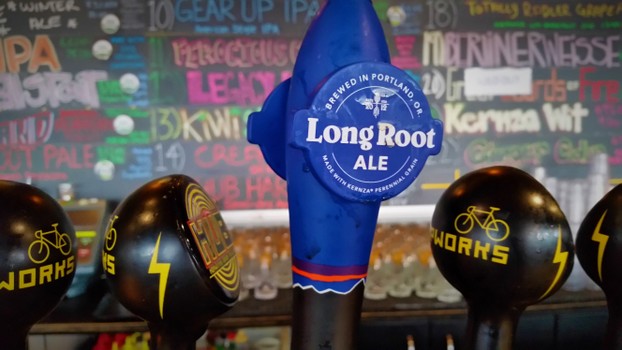
Still, it was a surprise to Ettinger. “I’ve always looked up to Patagonia as a brand,” he said. “So when they came to me and wanted to work together, I could hardly believe it.”
So, how did a guy who was inspired by the Kölsches of Cologne, Germany, wind up collaborating with an internationally recognized anti-corporate outdoor clothing company with a quirky food offshoot?
When I met Christian, I had just spent two-and-a-half days at Craft Beverage Expo, a conference on positioning, branding and promoting your craft beverage business. Over and over again the speakers kept repeating one word: passion. Find your passion. Follow your passion. Communicate your passion. Put blinders on anything outside your passion.
Passion. Passion. Passion.
Ettinger’s passions were high-quality beer and sustainable, ecological and responsible business practices. In 2004, he established himself as a World Beer Cup champion brewmaster. In 2007, he set out to establish himself as an eco-friendly entrepreneur.
This set him up for an entirely unique collaboration that gave his brewery access to an entirely new grain.
Long Root Ale, by the way, which uses 15 percent unmalted Kernza in the grain bill, is a very drinkable, solid-bodied pale with pine and tropical hop flavors. The impact of the Kernza is difficult to describe. I tasted something like fresh-cut wood and pine nuts, whereas Ettinger himself thought it was like cocoa leaves.
“Super polyphenol,” he said, because he knows the words for things.
Doing a Brewery His Way
Ettinger is the kind of guy who didn’t like seeing what could be done better but not having the power to change it.
“I don’t take direction well,” he says about the decision to leave Laurelwood and go out on his own. “I knew I could do it my own way and be successful.”
Given that he’s 10 years into doing it his own way and growing, it looks like he was right. From the start, he and his team put sustainability, recycling and efficiency at the center of all their decisions. To this end, they created initiatives regarding water, ingredients, energy use, and landfill impacts.
For example, when they bought the Powell Blvd location, instead of gutting it, they tore the existing building apart piece by piece so they could reuse everything from wood and fixtures to wiring, ductwork and plumbing.
Then they made a commitment to use as many locally sourced and organic ingredients as possible—their first beer was an organic IPA. Many of their beers are even made with certified salmon-safe hops (that is, hops farmed using practices that protect nearby rivers and streams). While HUB bottles several beers in 22 oz. glass, they opted for cans for the majority of their packaging in part for their lighter weight and its implications for shipping costs.
The B Corp Thing
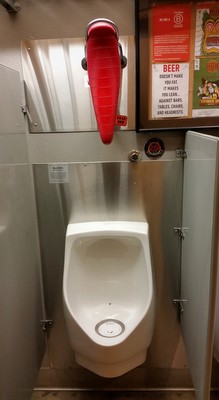
Hopworks is very proud to have a B Corp certification. It helps set apart their business from other cool breweries making good beer. For those who know what it means, it succinctly connotes sustainable environmental practices and ethical treatment of people and places.
When Ettinger and his team learned about the certification, Trever Bass explains, it was an obvious move for them. “The values were already there for us. They just put them into a framework that gives us ways to measure and shows us areas for improvement.”
Two common but key machines helped them get their water and energy usage down to B Corp-qualifying levels. The first is a heat exchanger, which allows them to recover heat from one boil for use in the next. The second is a recently installed clean-in-place (CIP) kit that allows them to reuse water up to five times. While the industry norm for water usage is in the area of 7-8 gallons of water per gallon of beer, Hopworks cut that in half to under 4 gallons of water per gallon beer. All this for a brewery that will produce just under 15,000 bbl in 2017. That’s a solid number, but that’s nowhere near another well-known B Corp brewery, New Belgium, which will probably hit about 1 million barrels this year. The point being that it’s not the size of the brewery that matters so much as what you value.
Becoming a B Corp had unintended but welcome consequences. For one, they became part of a growing network of businesses with similar values and vision. For another, they began to attract employees who shared those values, and as anyone who runs a business knows, an employee who shares your values is, well, invaluable.
A New IPA for a New Era
As Hopworks rounds out its first 10 years in operation and looks ahead to improving their B Corp ranking in 2018, Ettinger and crew are looking ahead to the next 10 years, and they’re beginning by reimagining their popular organic IPA.
Ettinger said the original recipe had served them well, but he acknowledged that even his tastes have changed over the years. The original IPA had a big, caramel malt body, plenty of resiny flavor, and a pounding of bitter hops. The new recipe, proudly branded Organic IPA, uses Munich malts for a lighter color that matches its lighter, subtler character. It is dry hopped, giving it a huge hop aroma while still working well the juiciness of the sip.
One could argue that it’s a nod toward the growing popularity of the East-Coast style IPA, but Hopworks has never done anything because they thought it would be popular. Ettinger’s passion has always been both bigger and smaller than that: what’s good for the planet, and what tastes good to him.
It’s a winning combination, and I look forward to getting back to HUB to see what they’re cooking up next.
Brad Fruhauff is a good dude, a great beer writer and a contributor to Craft Brewing Business. Plus, he wants to write for your brewery. Check out his other work here.

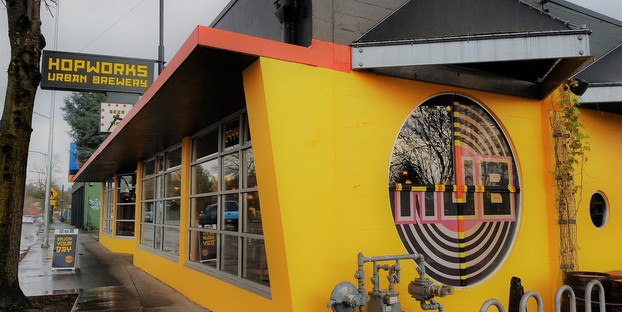
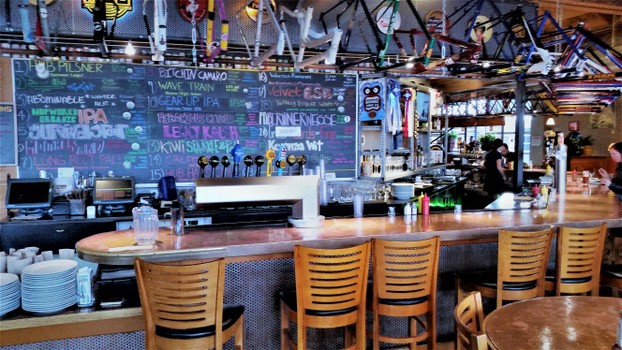
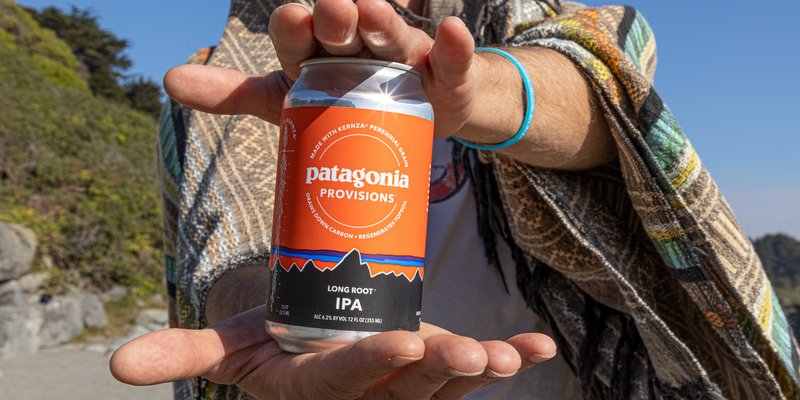



[…] Provisions Long Root IPA, a traditional West Coast style IPA made with organic ingredients and Kernza perennial grain. Looking for solutions to repair our food systems, this third release in Patagonia Provisions’ […]